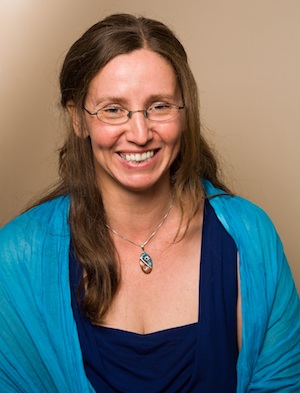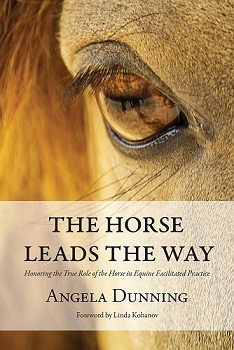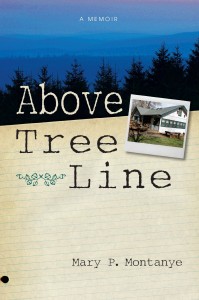
by Jenna | Apr 11, 2017 | Guest Posts
And we're back! It's time for the next installment of our "Author Insights" series. In this series, I'm introducing you to writers who've taken their writing all the way to the finish line of publication, and they share their "lessons learned" with you. There's nothing quite like learning from a writer who has made to the other side.
Plus, if you leave a comment at the end of the post before Friday, April 14th at 5 p.m. Pacific Time, you'll be entered to win an ebook copy of the author's book in a random drawing.
Meet Angela Dunning, author of The Horse Leads the Way
I'm so happy to introduce you to Angela Dunning. Angela was one of my earliest coaching clients. I loved working with her to help her get in touch with her core, essential self and discover her life purpose and calling to work with horses. She was an ideal client, putting in the effort and earning the results we arrived at... and it was a memorable, magical moment when we lit upon Equine Facilitated Learning (EFL) as her career direction. Since then, it's been a true delight for me to watch her career evolve and thrilling to see her publishing her book in her area of expertise. Honestly, words can't convey the excitement I feel seeing Angela bring our work to this level of fruition all these years later.
I asked Angela to share her insights about writing her book with us.

Angela Dunning on 7 Lessons Learned While Writing The Horse Leads the Way
 Writing my first ever book, a non-fiction handbook for my profession of equine facilitated practice, was one of the hardest and most challenging things I have ever done. I had no idea just what exactly was involved in creating and structuring an entire book. Having written articles and blog posts for many years now I found writing a book to be a whole different ballgame.
Writing my first ever book, a non-fiction handbook for my profession of equine facilitated practice, was one of the hardest and most challenging things I have ever done. I had no idea just what exactly was involved in creating and structuring an entire book. Having written articles and blog posts for many years now I found writing a book to be a whole different ballgame.
On top of this, the book’s focus was somewhat of a challenge for the industry it is aimed at, as I was attempting to question some current areas of practice and training, as well as hoping it would steer the profession back to a more horse-centered methodology. Gulp!
Many, many times I wanted to quit. It was too scary. Too hard. Too much work. And most of all, it took SO much longer than I had originally envisaged to really pummel and kneed the content into shape in a way that would be more palatable to the readers; not cause me too much trouble, and make it as easy and enjoyable a read as possible. On top of all of this, I had an unseen force pushing me on throughout. Maybe it was my Higher-Self/Soul, maybe it was also the horses themselves urging me on to express their concerns and needs, but something kept me going and would not let me quit. Whew…
So, here are my tips, having actually managed to successfully come out the other side of publication. I hope these tips will help and encourage other first-time writers, as I really felt this need myself as a first time writer. It was often a lonely and scary experience and hearing other writers’ experiences was both comforting and encouraging.
- Don’t underestimate how long the editing process takes. I found I did the initial main write in the first 6 months -- and this was a complete joy by the way! However, it then took a further 14 months of nothing but editing, restructuring, and proof-reading over and over again to complete the book.
- Avoid giving yourself arbitrary timescales for completion and publication. My biggest error all along was hoping it would be completed much sooner than it actually was. I had already begun talking openly in my networks about the book and its themes with some enticing social media marketing posts. But as the months wore on I had no energy to continue these as all my time and energy was taken up with the editing process. These arbitrary deadlines I kept giving myself in the end just caused me a ton of unnecessary stress and repeated disappointment. Now that I have a more realistic idea of how long it takes I wouldn’t even mention publication, book-launches and the like, until much nearer the end of the editing process.
- Find yourself a really good editor. Someone who can be completely impartial yet who can also understand your subject matter. Ideally this is someone who can see the bigger picture and help with structure, logic, and readability. If they also do an excellent job of proof-reading and technical editing, then great. If not, then find yourself a great proof-reader too. My advice would be to tackle the structure first, once you’ve got the bulk of your material written. Finalize the structure and flow, and only then move on to the proof-reading and final tidying-up phase.
- Don’t underestimate the amount of energy and commitment it takes to complete a book. It is a marathon and can be gut-wrenching a times. Many times you will want to quit, put it aside, do it another time. Having great support throughout this process is vital. You need friends and family to listen and empathize with you. And you also need really supportive cheer-leaders who you can go to when you feel low, and who will remind you why you are doing it and why your book is important.
- Treating the experience like it was my full-time job was vital, from the very beginning of sitting down to write the content right through to the grueling final months of editing and more editing. Making this commitment to myself and my life to finish the book was crucial. I let go of other assignments and greatly reduced my other commitments so that I could do this. For me personally, and for my mental wellbeing, this was essential to enable me to stay focused and committed to the end product and its purpose.
- Many people say this is like a birthing process. I absolutely agree with this analogy. The labor-pains I endured, which went on for MONTHS, were at times excruciating. Don’t underestimate just what it takes on all levels to write and publish a book. It takes self-care, nurturance of each part of the project, support from others, and ideally, a skilled publisher to hold your hand through those final, painstakingly slow weeks of design, further editing and layout before you even receive a hard-copy in your hands. The post-birth relief once it is finally out there though is immense and very much welcomed.
- Finally, I would also like to say that I have learned the post-publication period is a very important time for great self-care. Personally, I was exhausted and also a little down during this time. Suddenly I had nothing to focus on each day in such a concentrated way. There was an odd sense of emptiness permeating my days following publication. Coupled with a strange silence as the book made its way onto its readers’ bookshelves and into their hands. I had to now just sit back and wait for feedback and income.
Being gentle with yourself in this period is vital. It is not all champagne corks and celebratory dinners, although these are great, of course. It is also a vital period for rest, recuperation, and time to reflect on the intense process you have just been through, and perhaps put your nearest and dearest through too. Be gentle, rest, and allow yourself to sink into the enormity of what you HAVE accomplished. It is not for the faint-hearted! Writing a book takes courage, faith, and guts. And it changes how you see yourself and also how others see you too. A lot is shifting occurs as a result of becoming an author in addition to the actual material you have produced and this takes time to adjust to and integrate.
About The Horse Leads the Way
 The Horse Leads the Way undertakes a timely review of the rapidly growing profession of Equine Facilitated Practice (encompassing Learning, Coaching Therapy, and Psychotherapy but not therapeutic ridden interventions).
The Horse Leads the Way undertakes a timely review of the rapidly growing profession of Equine Facilitated Practice (encompassing Learning, Coaching Therapy, and Psychotherapy but not therapeutic ridden interventions).
Part handbook, part personal story, the author blends embodied, grounded techniques and compassionate insights to gently guide this method back to its greatest teachers: the horses themselves. Using an approach which is firmly grounded in the view of the horses as sentient beings in their own right, Angela guides practitioners and training providers to employ methods which honor this right throughout all areas of their work. Not only does this protect and support their equine partners’ wellbeing and enjoyment of their work, but, she argues, it also brings maximum benefit to the participants as a natural consequence. It is hoped the book will mark an important turning in this blossoming industry’s future development.
The Horse Leads the Way is available on:
About Angela

Angela Dunning is a sensitive, intuitive horsewoman. She is also a healer, teacher, writer, community worker and consummate holder of sacred space. A graduate of Eponaquest® Worldwide and LEAP, she established her Equine Facilitated Learning (EFL) practice, Equine Reflections, in 2007. She delivers private sessions, talks, workshops, taster sessions, supervision, mentoring, and training. She specializes in supporting women through navigating their own personal growth, reconnecting to their bodies, and reclaiming their true essence. Angela lives in Herefordshire, England and delivers her work in the UK and abroad by invitation.
You can find Angela online at thehorsestruth.co.uk.

by Jenna | Mar 28, 2017 | Writing Articles
Writers don't always recognize the grip of perfectionism when caught in its vise. But perfectionism is a wicked master that keeps us from achieving our true potential.
I should know. I struggle with perfectionism too.
Perfectionism is a Coping Mechanism
I learned to be a perfectionist as a way to keep myself safe. If I did something correctly (as evaluated by my family), I was praised and validated. If I did something incorrectly, I was critiqued. That critiquing resulted in a lot of shame for me. Shame that I wasn't good enough, that I wasn't measuring up. There was an implication I'd embarrassed my family with my error (even if it was something as simple as arranging crackers inartistically). If ever I objected to taking part in something aesthetic, I was told, "but you're so creative." So I would comply out of sense of obligation and guilt. And then when if or when my creativity didn't measure up, I would go deeper and deeper into hiding and shame. And yet at the same time, I loved (and love) being creative. Such a trap!
So many writers have similarly intricate sets of creative wounds, and perfectionism as a coping strategy is the result.
Perfectionism Endangers Excellence
Either do it perfectly, or don't do it at all.
Perfectionism tells us there's a right way and a wrong way to do things. To do anything. Perfectionism doesn't allow for mistakes or failure. But those so-called "failures" and "mistakes" are where the greatest breakthroughs and innovations happen. We've seen this through history, science, and technology. The path to success is rarely a straight line.
When we court perfection, we endanger our own brilliance, excellence, discovery, and evolution.
Perfectionism Lies to You
Interestingly, writers who are perfectionists will often self-describe as being "lazy."
Perfectionism says you aren't good enough, you aren't trying hard enough, and concludes that you must be lazy or you would be working harder. And in fact, when you procrastinate on taking creative action, you might even look lazy. But that is a lie.
The real reason you are procrastinating is that you are afraid you will not be able to do your work perfectly, so it's safer not to do it at all.
You are not lazy, you are terrified.
These "lazy" writers are also often the same writers with intense fantasies of landing on bestseller lists and high achievement.
Perfectionism also lures you into daydreams of massive success. Awards, recognition, fame. But rather than being motivating, these visions are also paralyzing, because just as before, you are afraid you will not be able to achieve this high level of success, so it's safer not to try at all.
Perfectionism likes black and white extremes. In perfectionism's eyes, you're either a massive failure or a massive success.
Perfectionism is lying to you.
Write Because You Love It
What if you were just you? Being your excellent, awesome self? Showing up, doing your work, writing because you love it, because you're called to it, not out of fear of blowing it or the hope of making it big?
Instead of striving for perfection, strive for excellence through action. Allow yourself to fall, and get back up, over and over again.
Keep writing.

by Jenna | Mar 21, 2017 | Guest Posts
And we're back! It's time for the next installment of our "Author Insights" series. In this series, I'm introducing you to writers who've taken their writing all the way to the finish line of publication, and they share their "lessons learned" with you. There's nothing quite like learning from a writer who has made to the other side.
Plus, if you leave a comment at the end of the post before Friday, March 24th at 5 p.m. Pacific Time, you'll be entered to win an autographed copy of the author's book in a random drawing. (IMPORTANT: You must be located in the United States to win.)
Meet Mary Montanye, author of Above Tree Line
I'm thrilled to introduce you to Mary Montanye. Mary joined my writing community at the beginning of 2013 in order to finish the memoir she'd been working on for five years before she joined us. She's now tackling her next big writing dream with the help of the writing community: Writing a romantic suspense novel. Mary quickly became a staunch advocate for the approach we use in the writing community and joined the team as a coach after participating as a member of the writing community for about a year and a half.
I asked Mary to share her insights about writing her memoir with us.

Mary Montanye on 5 Lessons Learned in Writing Above Tree Line

My memoir, Above Tree Line, took seven years to write and publish. During that time, I made a lot of mistakes. Here's what I learned and how I’d do it differently now.
1. Find support early in the process, but don’t let that support stop you from completing the project so you can move on to others.
I worked with a brilliant writer and teacher for much of the writing of Above Tree Line. I learned a great deal from her and will always be grateful for the time I spent as her student. But eventually I realized that somewhere in my work with her I’d become stuck. We were spending all our time together going over and over the same material — changing, tweaking, finessing. I began to wonder if my resistance to publishing and her desire to keep me as a student, might be getting in the way. I ended our working relationship and joined Jenna's writing community instead. I completed my memoir within a couple of sessions and moved into the publishing stage.
2. Don’t start at the beginning when writing a memoir. (This might be true for other types of writing as well. I’ll let you know when I finish the novel!)
Start anywhere you feel the heat — a memory, a taste, a color, an image, a sensation, a fragrance. Write from there. “She was born on August 16th at such and such hospital in Honolulu, Hawaii…” will bore you and make it more difficult to continue. Your reader won’t like it either. So why bother?
Let the first draft be all over the place. Let it be messy, filled with what was powerful and exciting for you. Ask yourself what interests you about your history or your family. Put it all in, even those parts you know you’ll never let stand. This draft is not the time to censor yourself. If you worry about what your readers will think, you might find you’ve left the gold in the ground and can’t remember where it was when you want to dig it up later.
3. Recognize fear and resistance for what it is — just fear and resistance. It doesn’t mean that you’re not a writer or that it is time to quit.
Fear and resistance got the best of me during the writing stage because I was not separating the creating of a project from the publishing or marketing of it. If I was in the middle of writing about a painful period of my childhood, for instance, and suddenly flashed on the idea that someday someone, perhaps even someone I knew and loved, would be reading it, I froze. I also stopped myself from writing when I’d compare my writing to that of others or when I read posts about the impossibility of publishing in the current marketplace. My coach and fellow writers in the writing community gently guided me back to what was in my power to do: write. Write the best story I could write now, they urged, and leave the rest for later.
4. When you share your writing other than with friends and family, it’s a pretty safe bet that someone won’t like it, that you will get rejections or negative reviews.
I was devastated when a woman who reviewed my memoir for a contest said that, even though the writing was good, she didn’t like either me or my husband. She was a stranger and still it hurt that she didn’t like me and that I’d portrayed my husband as unlikeable as well, at least in her eyes. I made this one review more important than it was — even more important than the complimentary reviews I’d received. A negative review almost stopped me from ever sharing my writing with anyone again.
The lesson in this for me, and I hope for you, is that if you write honestly, if you allow yourself to be vulnerable on the page, you will affect people. And that’s what we want, right? It’s okay if some of our readers don’t approve, like the writing, or even us. Feel your feelings about the review. The writing community and my coach helped me with this, too. They shared my pain and helped me to put it aside, to continue on.
5. Keep at it. If you have a desire to write, you are meant to write. Jenna would say you have a calling, and we both believe that callings are meant to be followed.
When I held my published memoir in my hands, felt the weight of it, and flipped through its pages, it was one of the greatest days of my life. I was so proud. I wish you the same experience. No matter where you are in your writing, no matter how unsure you may feel, keep going. Get help if you need it, but whatever you do, don’t give up. It is so worth it!
About Above Tree Line
 From Amazon.com: "The traumas and losses of childhood are often buried. The child grows up appearing normal, unscathed and perhaps even successful. But often what is buried comes back to attack at the very moment when life is reaching its pinnacle. This is the story of one woman’s spiral downward into physical and mental breakdown and her return to wholeness by courageously, and some would say recklessly, following her intuition. Ms. Montanye’s intuition leads her to a tiny town in a Colorado canyon alongside the wild and scenic Cache La Poudre River. There, she immerses herself in the grandeur and beauty of the surrounding mountains. When her journey begins, no one involved can know that it will lead to such a powerful and bittersweet end: an end that includes healing for herself, her marriage and for the difficult relationship she endured with her mother."
From Amazon.com: "The traumas and losses of childhood are often buried. The child grows up appearing normal, unscathed and perhaps even successful. But often what is buried comes back to attack at the very moment when life is reaching its pinnacle. This is the story of one woman’s spiral downward into physical and mental breakdown and her return to wholeness by courageously, and some would say recklessly, following her intuition. Ms. Montanye’s intuition leads her to a tiny town in a Colorado canyon alongside the wild and scenic Cache La Poudre River. There, she immerses herself in the grandeur and beauty of the surrounding mountains. When her journey begins, no one involved can know that it will lead to such a powerful and bittersweet end: an end that includes healing for herself, her marriage and for the difficult relationship she endured with her mother."
Above Tree Line is available on:
About Mary
 Mary Montanye lives on the central Oregon Coast where she gratefully writes and coaches while often resting her eyes on the beauty of the natural world that surrounds them. Mary has a master's degree in clinical social work from the University of Iowa and counseled individuals and families through nonprofit agencies and her own private practice for many years before retiring and following her dream to write.
Mary Montanye lives on the central Oregon Coast where she gratefully writes and coaches while often resting her eyes on the beauty of the natural world that surrounds them. Mary has a master's degree in clinical social work from the University of Iowa and counseled individuals and families through nonprofit agencies and her own private practice for many years before retiring and following her dream to write.
You can find Mary online at www.marymontanye.com.

by Jenna | Mar 16, 2017 | Writing Articles
I've been sick too much this year, and thought it worth revisiting one of my favorite articles from 2013 on "when to write and when to call it a day." Here's an updated version for you:
During a live coaching call for my Called to Write community, a writer once asked about how to know when to push through and write if you're not feeling well versus how to know when to focus on regaining your well-being.
In my opinion, the answer depends a bit on the circumstances, so let's look at some specific scenarios.
1. You've just come down with a wicked cold or flu.
Assuming you have a solid, regular habit in place, when you get really sick or you're just those early stages of wretchedness, it's okay to take a few days off from writing, knowing that you'll get back to it as quickly as you can.
When I'm feverish, wiped out, or worse, I know the most important thing I can do for my body is to rest and heal.
I have found myself writing even while sick at times -- because I felt truly drawn to work on my piece -- but in this case my focus is very much about listening to my body.
This is very much like being an athlete, and knowing whether or if to train when you're sick or injured, and when to take a day off.
I also trust myself enough deep down, after months of regular writing, to know that I'll re-establish my habit as soon as I am able, usually within 2 to 3 days. The longer you're away from your habit, the harder it is to get going again, so it will behoove you to pay attention to starting again quickly, even if you start small, such as in 15 minutes a day.
2. You're going through a rough patch in your life, you're generally tired or run down, maybe you're not sleeping very well, or maybe you're mildly sick.
On the other hand, if the chips are down and you're having a rough time in your life, maybe you aren't sleeping well, or maybe you're getting better from that wicked cold or flu, I'm inclined to recommend that you simply ease up on your writing time a bit, but still keep writing. When I've gone through particularly difficult phases in my personal life, I've made a point NOT to stop writing, but to carry on at my "rock bottom minimum" level of writing.
As a writer, it's worth knowing what that minimal level of involvement is with your work for you -- the amount of writing that will keep you engaged and connected to the work. For me, it's a minimum of 15 minutes of writing a day, even if it's morning pages just to keep writing flowing, though ideally it's on my main project. For another writer, it might be 5 minutes or 60 minutes. It varies between individuals, but the point is, know what YOU need to do to sustain your connection to the work even during a challenging phase.
I gained tremendous confidence and strength from seeing myself commit to and show up for doing the work every day, no matter what.
In concert with easing back to your minimum, when you're going through a phase like this, make a point to ramp up your self-care. Put sleep, healthy food, good hydration, fresh air, and exercise at the top of your list and get yourself back into balance. But do stay connected to the work.
3. You're in a bad mood or someone said something terrible to you and your confidence is shaken.
A common refrain among writers -- particularly those of us who are more sensitive and easily affected by other people and experiences -- is "I'm just not in the right mood to write today." This can particularly come up if you've lost confidence because of something someone said about your writing or if you've been hooked by the Comparison Monster ("Everyone else is doing so much better at this than I am!"), or even if you're just in a crummy mood.
Hear this now: There’s a difference between self-care and mood.
Being in a bad mood is NOT a good reason not to write.
Let's face it, you wouldn't be here, right now reading this, if writing was easy to do.
As Steven Pressfield says, "It’s not the writing part that’s hard. What’s hard is sitting down to write."
Don't let a bad mood or a rough day become an excuse not to write.
There are far too many reasons to resist and procrastinate about writing, and if anything, I think we need to err on the side of writing more regularly and consistently than not.
As Brian Johnson says (via Jack Canfield), "99% is a bitch. 100% is a breeze." So hang in there, do the work, and make it easier on yourself. (A side note: A weekdays-only practice at 100% works.)
You'll most likely be pleasantly surprised that your level of productivity and your ability to create are not at all related to your mood.
In fact, you may find -- as many of our Called to Write members do -- that your mood may well shift when you write anyway, and if even if it doesn't, you'll still have demonstrated your commitment to yourself, which is deeply affirming and happiness-building.
(See also my post called "You Can Change Your Life in a Split Second.")
4. You're going through a painful period of loss, grief, or personal anguish.
At another end of the spectrum is experiencing an extreme loss -- like a death of a loved one. When my grandmother died in 2012, I felt as though I was in another world -- approaching the veil of life and death on some level -- and I found it very difficult to write fiction in yet an entirely different world. So I choose to take a few days off from "real" writing, though I did do a tiny bit of tinkering with my script one day.
On the other hand, Steven Pressfield recommends writing even during times of "personal anguish" in his excellent post of the same title.
He says, "I’m not saying pain is good. I’m not advocating screwing up our lives for the sake of art. I’m just making the observation that our genius is not us. It can’t be hurt like we can. Its heart can’t be broken. It’s going to send the next trolley down the track whether we like it or not."
My experience is that those few brief days of being between worlds while in grief are the only spans of time in which I have felt truly unable to write, and then, just as I've said above, I still get back to writing as quickly as possible.
5. You need to refill your creative well.
All this said, I am a firm believer in taking big "put my feet up" days off. I love to pick out a day on my calendar when I can feel the need building up, that I block off "just for me." I take my son to school, and then proceed to do whatever I feel like doing, which usually involves some combination of a fantastic herbal or decaf beverage, a movie in bed, a nap, maybe a meal at a favorite restaurant. It might also involve going shopping at a beloved and inspiring store, like an art store or museum shop. Whatever it is that feels inspiring and uplifting.
On these days, I fully, completely enjoy my Not Writing time, and I know I'm replenishing and rebuilding to dive back in the next day.
Bottom line
The bottom line, for me, is that each one of us needs to experiment, listen to our own bodies and inner selves, and find what works best for us. And, like I said, given the massive opportunities for resistance, fear, avoidance, procrastination, and self-doubt, my strong recommendation is to find a way to stick to your work as regularly and consistently as possible.
Warmly,

You may also be interested in:
This article was originally published in January 2013 and has now been republished with revisions.

by Jenna | Mar 8, 2017 | Writing Articles
Morning pages are something I mention fairly often here at Called to Write, but haven't ever defined. Many writers are unfamiliar with the concept.
Morning pages are a writing tool created by Julia Cameron and described in her book The Artist's Way: A Spiritual Path to Higher Creativity*.
The core idea is to write three long-hand, stream of consciousness pages every day, first thing in the morning upon awakening, no matter what, even if you only write, “I don’t know what to write,” over and over again.
How to Write Morning Pages in 3 Easy Steps
Here are three easy steps to help you get started writing morning pages:
Step 1: Get yourself a notebook to write in (and put it somewhere you'll find it quickly and easily in the morning).
I like something with half-size sheets so that it doesn't take me all day to fill the pages. My favorite is this steno notebook*, because I love the paper weight and the size of the pages. I prefer using something a little more disposable like this than a fancy journal since I don't want to feel attached to them. Though I've kept all of my many notebooks so far, I expect to eventually have a bonfire with them and I don't want gorgeous leather-bound books energetically stopping me from letting go. I keep my notebook with my favorite pen tucked into my nightstand for easy retrieval upon awakening.
Step 2: Write three pages — about ANYTHING — when you wake up.
I love to write morning pages before I do anything else other than make a quick trip to the bathroom and put in my contact lenses. Then I hop back in bed and write. My pages tend to take me about 20 minutes. Some writers prefer to get up and make coffee or tea, and sit in a cozy spot to write their pages. If you're tempted to stop short of three pages, I highly recommend pushing through. There's so much insight that happens once you get deeper in (usually about the 2.5 page mark) -- don't miss it. Don't worry about what you're writing -- just write whatever is swirling around in your brain, even if it's boring, whiny, ridiculous, or pointless. It doesn't matter.
Step 3: Repeat the next day... and don't look back.
Write the next day, and the day after that, and the day after that. Morning pages are one of those tools for life that are worth holding onto. Especially in the early days of writing morning pages, don't re-read your pages. Julia Cameron even recommends stapling the pages together when you first start so you aren't tempted to go back. Just put the words on the page, and move on. It's a tool, not a record.
5 Reasons You'll Want to Write Morning Pages
Some pretty amazing and miraculous things start happening once you've been writing morning pages for a while. Here are five reasons you'll want to make them part of your regular writing routine:
1. Morning Pages Lead to Creative Recovery
Morning pages are a powerful tool for creative recovery. Many writers and artists experience creative burnout at some point and struggle to regain their creative footing and orientation. Writing morning pages helps us find our way back to our creative selves.
Morning pages also are a way to "rest" on the page -- a way to keep the words flowing even if you're feeling blocked with writing your book or what to write next, and can be a "bridge" to keep you writing between finishing a draft and tackling your next revision when you don't want to lose your writing habit and momentum.
Writing pages this way also helps free us from perfectionism. Since we're writing without editing or for publication or even for sentence structure, it gives us great practice at letting the words flow freely without judgement or internal censorship.
2. Morning Pages Prepare Your Mind for Creative Insight and Discovery
Writing morning pages will help you clear away any angst, fear, worry, and doubt -- in any area of your life. Morning pages are not journal pages -- you aren't (necessarily) going to be recording your life experiences through your morning pages. Instead, use them to purge the voices of negativity that hold you back. Get them out onto the page and out of your head, so you can move to your writing with a lighter heart and fresher spirit. So go ahead and vent and complain. Get it all out and leave it behind you.
What's so cool about this is that it helps you quiet your mind. And a quieter mind is one better prepared for creative insight and discovery.
3. Morning Pages Foster Self-Trust and Honesty
Morning pages require honesty. Writing every day about what bothers you and what’s going on has a way of surfacing truths for your attention and recognition. You just can't get away with complaining about the same thing over and over again without feeling called to make a change. You'll notice what’s working and what's not working in your life. And as you listen to yourself, you'll build trust with yourself and your inner wisdom because you'll be noticing over and over again where your inner voice is giving you information about what's going on -- and you'll see the evidence of it.
4. Morning Pages Are an Antidote to Self-Forgetting
Morning pages are a powerful antidote to self-forgetting. When you write morning pages, you'll reconnect with yourself. In my experience, it can be challenging to “come back to yourself,” especially in a world where busyness and materialism abound (and especially as a sensitive, intuitive, introverted writer). All the noise around us can make us feel lost and disconnected from ourselves, and morning pages bring us back to who we are.
A writer who knows herself is better able to deliver her highest quality work.
5. Morning Pages Are a Pathway to Self-Acceptance
Once you’ve stepped into this place of consciousness, it’s hard to go back. Fundamentally, morning pages give you permission to be who you are. They are a pathway to a radical form of self-acceptance. By being true to yourself and fully expressing all of yourself without judgment, you honor the truth of who you are.
Personally, I have found morning pages invaluable, from plain-old venting to accessing powerful insights. I use my pages to whine, moan, and complain. I unload my greatest fears and my deepest desires. And I ask for guidance from my inner self. It's an incredible way to clear your mind and listen to your heart.
Answers to Common Questions About Morning Pages
- Do I have to write morning pages in the morning? Yes. :) Though you get to make your own rules for yourself, and of course no one can tell you there's anything you HAVE to do with your writing. At the same time, this is such an incredible writing tool it's worth experimenting with as prescribed.
- Do I have to write morning pages long-hand? Julia Cameron (and I) both recommend writing morning pages long-hand. There's something incredibly transformative about writing your pages out by hand. And... there's a pretty nifty site called 750words.com as an option for writing pages online. You could certainly use ByWord or Scrivener as well (two of my favorite writing tools).
- What's the different between morning pages and journaling? The main difference between morning pages and journaling is that morning pages are about ANYTHING. It's about clearing out, writing stream of consciousness style, about whatever is circling your brain. Journaling can be the same, of course, but it tends to more "about" something, such as recording your day, or exploring a particular issue. And while that happens sometimes in morning pages, it's just as often as not complaining about errands we have to run or other things we're processing.
- If your writing time is limited, is it better to just focus on your book than on doing morning pages? Maybe yes, maybe no. I've made the choice for the last couple of years since baby #2 to focus on my primary writing projects rather than doing pages because time (and sleep!) has been at such a premium. And... I've dearly missed them. I've gone to doing a morning journal check-in lately instead, but I'm going back to morning pages too.
- Can I share my pages with other people? I don't recommend sharing your morning pages with anyone else, ever. Part of the magic and what's makes them so powerful is that they are completely private and sacred. We can't fully reveal ourselves on the page when we're holding back for fear of what someone else might think. So keep them just for you, and protect yourself that way. This is great practice for learning to more fully reveal yourself when writing stories and books as well.
- Can I write evening pages instead? If you want to, though really, they ARE quite different animals. You might find that you want to do both. My colleague Jill Winski just wrote a post about writing evening pages in addition to her morning pages. Similarly, The Ultimate Writer's Toolkit includes a set of morning and evening journal prompts, but focused on writing only. The progress journals that the writers keep in my Called to Write community can also somewhat fulfill the end of day writing "check-in" role that evening pages can play, but again, only around that day's writing. My take: write morning pages to write morning pages, and use your other tools to fulfill their unique purpose rather than making substitutions.
* Affiliate link

![]()
 Writing my first ever book, a non-fiction handbook for my profession of equine facilitated practice, was one of the hardest and most challenging things I have ever done. I had no idea just what exactly was involved in creating and structuring an entire book. Having written articles and blog posts for many years now I found writing a book to be a whole different ballgame.
Writing my first ever book, a non-fiction handbook for my profession of equine facilitated practice, was one of the hardest and most challenging things I have ever done. I had no idea just what exactly was involved in creating and structuring an entire book. Having written articles and blog posts for many years now I found writing a book to be a whole different ballgame. The Horse Leads the Way undertakes a timely review of the rapidly growing profession of Equine Facilitated Practice (encompassing Learning, Coaching Therapy, and Psychotherapy but not therapeutic ridden interventions).
The Horse Leads the Way undertakes a timely review of the rapidly growing profession of Equine Facilitated Practice (encompassing Learning, Coaching Therapy, and Psychotherapy but not therapeutic ridden interventions).




 From Amazon.com: "The traumas and losses of childhood are often buried. The child grows up appearing normal, unscathed and perhaps even successful. But often what is buried comes back to attack at the very moment when life is reaching its pinnacle. This is the story of one woman’s spiral downward into physical and mental breakdown and her return to wholeness by courageously, and some would say recklessly, following her intuition. Ms. Montanye’s intuition leads her to a tiny town in a Colorado canyon alongside the wild and scenic Cache La Poudre River. There, she immerses herself in the grandeur and beauty of the surrounding mountains. When her journey begins, no one involved can know that it will lead to such a powerful and bittersweet end: an end that includes healing for herself, her marriage and for the difficult relationship she endured with her mother."
From Amazon.com: "The traumas and losses of childhood are often buried. The child grows up appearing normal, unscathed and perhaps even successful. But often what is buried comes back to attack at the very moment when life is reaching its pinnacle. This is the story of one woman’s spiral downward into physical and mental breakdown and her return to wholeness by courageously, and some would say recklessly, following her intuition. Ms. Montanye’s intuition leads her to a tiny town in a Colorado canyon alongside the wild and scenic Cache La Poudre River. There, she immerses herself in the grandeur and beauty of the surrounding mountains. When her journey begins, no one involved can know that it will lead to such a powerful and bittersweet end: an end that includes healing for herself, her marriage and for the difficult relationship she endured with her mother."

